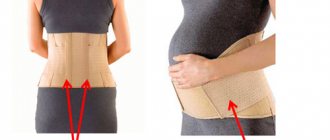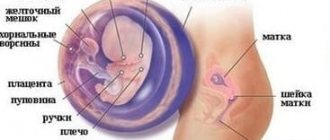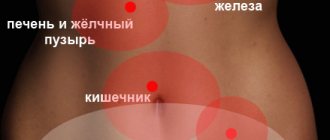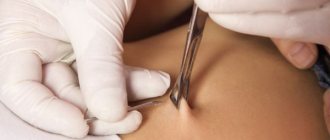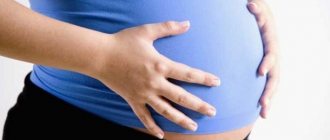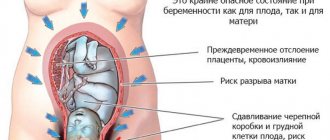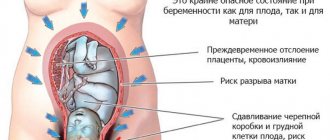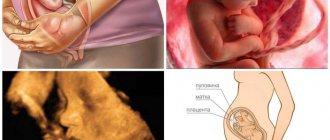When a woman is expecting a baby, she cannot help but worry about her health and listens to her body very carefully during this period. Tingling in the uterus in early pregnancy is a fairly common occurrence. During the normal course of pregnancy and if the woman does not experience any inconvenience during this condition, her well-being does not deteriorate and there is no need to worry.
But there are also threatening symptoms associated with this tingling in the uterus. How to distinguish when a condition requires an immediate visit to the doctor, so as not to endanger the life of the child and the expectant mother herself? This will be discussed in this article.
Tingling in the uterus in the first trimester
Tingling in the uterus during early pregnancy is primarily associated with its growth, which begins intensively at about 5 weeks.
Main reasons
, causing tingling in the lower abdomen:
- Tension of the ligaments that support the uterus
. As the uterus grows, the ligaments are constantly stretched, which causes pain in the woman. In this case, tingling is often felt closer to the groin areas and intensifies with sudden movements (strong coughing, sneezing, sudden turns of the body, fast walking). When changing position, such sensations quickly stop; - Adaptation of the muscles of the anterior abdominal wall
. The abs gradually begin to lose their shape and adapt to the size of the growing uterus. Such discomfort also occurs more often with sudden movements and disappears fairly quickly.
Pathological tingling
Stitching sensations in the uterus are not always physiological. There are many pathological conditions that begin with a slight tingling sensation in the abdomen. But in these cases they were all accompanied by other alarming symptoms.
Here are a few possible reasons:
- Threat of spontaneous abortion or premature birth. In this case, the discomfort that begins does not go away, but, on the contrary, intensifies, pain appears, the abdomen becomes tense, and bleeding or rupture of amniotic fluid may occur.
- Placental abruption. In this case, there is stabbing pain and uterine bleeding; this condition threatens pregnancy and requires urgent medical intervention. Read more about placental abruption→
- Cystitis. The resulting tingling sensation intensifies during urination. In this case, symptoms such as burning, itching and increased body temperature may appear. Read more about cystitis during pregnancy→
- Intestinal infections. In addition to tingling and painful sensations in the abdomen, a woman may complain of nausea and vomiting, diarrhea and hyperthermia.
- Appendicitis, renal colic and other conditions requiring urgent emergency care. Read more about appendicitis during pregnancy→
Tingling in the uterus in the second trimester
In the second trimester, more pronounced growth of the uterus begins, it reaches considerable sizes, which leads to compression of the internal organs - in particular, the stomach and intestines. As a result, some disturbances in the functioning of the digestive system occur (tendency to constipation, increased gas formation), which can cause tingling in the lower abdomen. Such sensations are also normal and do not require special treatment. During this period, a woman needs to thoroughly review and normalize her diet: limit the consumption of “heavy” foods (spicy, smoked foods, marinades), drink enough liquid during the day, eat food often, but in small portions.
How to distinguish between dangerous and safe tingling sensations
Since tingling sensations in the uterus can be caused by both physiological changes and pathological processes, it is important for expectant mothers to be able to distinguish between these conditions.
| Signs of harmless uterine tingling | When you need to see a doctor urgently |
| The unpleasant sensations are weak, short-lived, last no more than a few minutes, and often radiate to the pubis and perineum. |
Discomfort appears after physical exertion, with sudden movements, but most often during rest.
There are no additional alarms.
Vaginal discharge of different colors appears.The discomfort in the abdomen is strong, does not go away for more than an hour even after rest, and negatively affects the general condition.
Shooting in the uterus is accompanied by severe abdominal tension, frequent urination, and increased temperature.
Tingling in the uterus in the third trimester
Tingling in the uterus in late pregnancy is common and is associated with the body beginning to prepare for the upcoming birth. From about 35 weeks, the uterus periodically begins to become more toned, the cervix prepares to open and begins to gradually smooth out and soften. These processes cause a tingling sensation in the abdomen, which manifests itself more strongly than in the early stages.
Tingling in late pregnancy
In the third trimester, the woman already feels the baby actively moving, which increases pressure on the bladder.
False contractions, which are accompanied by a stabbing feeling in the uterine area and some stiffness in the abdomen, may indicate an imminent delivery. In the later stages, after 37-38 weeks, such symptoms, together with nagging pain and rhythmic contractions of the uterus, indicate that the baby will soon be born, so it is necessary to immediately contact an ambulance. Discomfort in the lower abdomen may be accompanied by additional symptoms:
- a feeling of nausea and upset stomach, together with a rise in temperature, indicate a possible complication of appendicitis or poisoning. In the first trimester, this situation can be caused by an ectopic pregnancy.
- discomfort and bloody vaginal discharge, even of a minor nature, indicate serious changes in the body, such as placental insufficiency or leakage of amniotic fluid. In this case, you will need to immediately consult a doctor, as there is a risk of miscarriage or premature birth.
- pain, burning sensation when urinating, symptoms of infectious processes in the genitourinary system or unstable kidney function.
It is necessary to understand that prolonged independent tingling is not a pathology. If the process intensifies or is accompanied by additional symptoms, you should consult with medical specialists.
When to see a doctor
With physiological tingling, a woman does not experience much discomfort: many pregnant women describe such sensations as a small prick with a needle in the lower abdomen, sometimes radiating to the perineum. Such sensations are most often momentary or quickly pass after a change of position and a short rest. In any case, the tingling sensation should not normally last more than 60 minutes.
important However, it should be remembered that if during pregnancy there is a tingling sensation in the uterus, this is not always a physiological sensation and sometimes it requires the mandatory help of specialists.
You should consult a doctor in the following situations:
- The appearance of bloody or brown discharge from the genital tract
: during a normal pregnancy, this kind of discharge should not occur. This situation is dangerous and can signal an abruption of a normally located or presenting placenta, which has begun spontaneous termination of pregnancy; - The sensations cause the woman severe discomfort
, disrupt her general well-being and do not go away within one hour or a short rest; - Feelings of tension in the uterus
: it becomes hard, “stony”. This indicates increased uterine tone, which is also dangerous in terms of premature termination of pregnancy; - The appearance of dysuric disorders
: pain when urinating, especially at the end of the act, frequent urination in small portions of urine, a feeling of heaviness in the lower abdomen. These symptoms are caused by the development of inflammation of the bladder - cystitis or other infectious diseases of the urinary system and require mandatory treatment under the supervision of a urologist; - Stool upset, vomiting, fever
. Such complaints are typical for the occurrence of an intestinal infection and, in the absence of the necessary treatment, can be dangerous for the woman herself and the development of the child. A pregnant woman should be consulted by an infectious disease specialist and a gastroenterologist and, if necessary, hospitalized in a hospital. In addition, such symptoms in combination with abdominal pain are characteristic of acute surgical pathology (appendicitis, etc.), which also requires urgent hospitalization.
Tingling in the left side of the lower abdomen
Tingling in the lower abdomen during pregnancy can be caused by a variety of reasons. We have described most of them to you. However, there are other factors that cause such sensations.
Such pain may not be related to pregnancy. They may be caused by problems with the organs.
A delay of menstruation within a week does not always indicate pregnancy. This problem can be caused by problems in the female part or simply by a cycle failure.
If acute abdominal pain occurs, you should urgently consult a gynecologist, or even call an ambulance. However, if you are bothered by slight shivers and chills, there is no need to worry. Abdominal pain on the left side can be caused by physiological changes during pregnancy. However, this may be a symptom of serious inflammation of the internal organs.
Toxicosis during pregnancy: 3 types
Why severe pain may occur in the left side:
- Such symptoms may indicate problems with the spleen;
- Also, pain on the left side can be caused by pathologies in the intestines;
- Sometimes pain in the left side means the presence of an inflammatory process in the left kidney;
- Diseases of the diaphragm can also cause severe pain in the left side;
- Diseases of the ovaries, adhesions and cysts on the left side of the body;
- Ectopic pregnancy also causes severe pain.
As you can see, the causes of pain on the left side of the abdomen can be not only serious, but also life-threatening. Therefore, if the pain is severe, do not delay going to the doctor.
Feelings in the abdomen during ovulation and conception
Depending on the threshold of sensitivity, sensations before ovulation and during fertilization in women may be different. A nagging pain in the lower abdomen in the middle of the cycle indicates that the egg will soon be released. The discomfort lasts for 1-2 days and is a pressing pain.
A woman has the feeling that there is something large in one side of her abdomen. This is how the growth of the dominant follicle manifests itself. During the day before ovulation, it reaches its maximum size. It happens that two follicles grow in one ovary at once. In such a situation, the bursting sensations are more vivid. The release of the egg may be accompanied by minor pain. However, not every woman can feel ovulation; many experience absolutely nothing unusual in the middle of the cycle.
During fertilization, even the most sensitive women cannot experience any sensations. The sizes of the egg and sperm are so small that it is impossible to feel their fusion.
Feelings in the abdomen in early pregnancy can be very different. Often they turn out to be far-fetched, because the woman is trying to look for symptoms of pregnancy. The fact that conception has occurred (or rather,) may be indicated by a slight stabbing pain in the uterus. Attachment of the egg is accompanied by damage to the mucosa. The embryo “digs” a hole for itself in the endometrial layer. This also causes damage to small blood vessels and the appearance of brown discharge (but this does not always happen).
When conception occurs and a woman has a stomach ache during sexual intercourse, this may indicate an inflammatory process in the pelvis or other diseases. Regularly recurring discomfort should alert you and become a reason to contact a gynecologist. After conception, the lower abdomen may be slightly tight and painful, as the uterus becomes toned. This condition is caused by various factors:
- embryo implantation;
- intestinal problems;
- progesterone deficiency;
Acute pain after conception, localized in the lower abdomen, should not be normal. If such concern arises even before the onset of menstruation, then you need to consult a doctor. Perhaps we are talking about a symptom of a pathological process. All women looking for signs of pregnancy should know that during conception the stomach cannot hurt much. Minor discomfort, pulling or pressing sensations, tingling do not cause much concern and go away on their own within a few days. Any acute, unbearable pain that disrupts the usual rhythm of life is a reason for examination.
The most common causes of pathological pain
Isthmic-cervical insufficiency
Caused by muscle insufficiency of the cervical canal (cervix). The cause of the pathology can be abortions preceding pregnancy, previous “female” diseases, or too active sex. The cervix simply cannot withstand the load and begins to open. The process is accompanied by pains and tingling sensations, which are not always strong. Sometimes barely noticeable. But if the process is not stopped, the situation threatens the loss of the fetus.
In this case, surgical intervention is used: sutures are placed on the cervical canal, which helps maintain the pregnancy.
Usually with this problem there is bloody discharge. If you notice such symptoms, you should immediately contact your gynecologist.
Cystitis
A very common disease among women. The infection enters the urinary tract through the urethra and causes inflammation. Main signs: stabbing, cutting pain in the lower abdomen, temperature, fever, painful urination. Cystitis is easily treated, but in the early stages. At the slightest suspicion of this “sore,” you need to take immediate action. Careful genital hygiene helps avoid infection.
Ectopic pregnancy
In the early stages, localized pain in the lower abdomen (right or left) may indicate that the fertilized egg has attached not to the uterus, but to the fallopian tube. As the fertilized egg grows, the woman may experience mild pulling or stabbing pain. If the pathology is not eliminated in time, the pipe will burst and the pain will be severe and sharp. In any case, immediate surgery is needed to remove the fertilized egg.
Today, in such cases, abdominal surgery is rarely used, more often laparoscopy (point penetration into the abdominal cavity). The method is gentle and bloodless. Within a couple of hours the patient goes home. Recovery is also quite fast.
Appendicitis
Unpleasant sensations are localized in the umbilical region on the right. They can be weak, growing or sharp and strong. It all depends on the stage of inflammation. But as a rule, the symptom does not go away, but only intensifies. It doesn’t get any easier either lying down or sleeping. Laparoscopy is also used to remove the appendix. A timely operation does not threaten the fetus.
Regular visits to your supervising doctor will help you avoid many problems. Subscribe to blog updates to stay updated on new useful materials. And, dear expectant mothers, do not forget to share this information with your friends, especially if there are other lucky women in your circle who are expecting babies.
Pain in the uterus when walking during pregnancy
Periodic painful sensations that occur when walking in pregnant women are considered normal in gynecological practice. The growth of the uterus and stretching of the muscles during the development of the embryo can cause minor pain when the woman moves, as well as when sneezing and coughing, and lifting heavy objects. Quiet rest usually relieves such symptoms. But if the pain when walking is very strong and acute, then you need to consult a doctor on this issue.
Those women who are experiencing this phenomenon for the first time should try to independently determine where the pain is felt most. Place your palm on the abdominal wall and slowly press on the stomach, noting where it hurts the most. It is better to carry out the examination in a lying position.
Determine the nature of the pain. It can be cutting, stabbing, pulling, aching, bursting. What other symptoms are there? Is it accompanied by cough, nausea, vomiting? If the answer is yes, call an ambulance.
In most cases, pain when walking in expectant mothers appears after physical exertion, hypothermia and due to stress. In this case, you should not swallow pills, but try to calm down, relax, and “lie in bed.” However, if the abdominal pain is severe and does not allow the expectant mother to move normally, then this may indicate the development of serious pathologies. Therefore, in such cases, it is necessary to urgently seek medical help.
Tingling in the lower abdomen during early pregnancy
- the introduction of a fertilized egg into the body of the uterus causes minor pain;
- increased blood flow and a growing, changing shape of the uterus puts pressure on the inferior vena cava - this is accompanied by pulsation and tingling;
- a stony belly is a sign of tone. This is natural for the early stages. If these phenomena are not systematic, there is no reason to worry;
- Bloating, which can cause tingling, is very common during the first trimester. This is due to an increase in the hormone progesterone or minor digestive disorders due to the changing taste preferences of a woman.
How to reduce pain?
- Do not eat fatty, spicy or bloating foods. Eat 5-6 times a day in small portions.
- Be less nervous, don’t lift weights.
- If you feel toned, you need to take a No-shpa tablet, lie down to rest, or take a warm (not hot!) shower.
- Try to relax more and be in the fresh air.
- At the beginning of pregnancy, physical activity is necessary for expectant mothers. Walking, swimming, yoga or gymnastics for pregnant women will only benefit them. This will strengthen and prepare the muscles for pregnancy and childbirth and reduce pain.
As a rule, these measures are enough to alleviate the condition in the first trimester.
Alarming symptoms
If the pain is acute, cramping and is accompanied by even slight bleeding, you should immediately contact a medical facility. These symptoms could mean a miscarriage or an ectopic pregnancy.
Recommendations
What can be done if the uterus is pulled during early pregnancy? In order to improve the condition and reduce unpleasant tingling sensations, the following activities may be recommended:
- Warm shower. It helps relax cramped abdominal muscles.
- The use of special gymnastics for pregnant women, which is designed specifically for pregnant women, taking into account all the features of this condition.
- Yoga for pregnant women helps you master relaxation and muscle stretching techniques. Limit sudden movements, try to do everything smoothly, without tension.
So, we have looked at why the uterus hurts during pregnancy. After studying this article, a woman who is expecting a baby will no longer be so anxious about physiological tingling in the uterine area, and in case of any doubts about her condition, it is always important to contact her doctor or seek help from a clinic.
Pregnant women monitor any changes. The increased attention to changes in the body and her own feelings is explained by the fear of missing a possible threat to her unborn child.
Many expectant mothers complain of tingling sensations during pregnancy. The woman cannot figure out what causes such sensations, so she begins to get nervous and worried. However, this symptom may not pose a danger to the further development of pregnancy; moreover, sometimes it is an absolutely normal phenomenon, reflecting physiological processes in the female body. Let's figure out what may be causing the tingling sensation during pregnancy.
Pain in the cervix during pregnancy
The uterine cervix has an important anatomical and functional significance while expecting a child.
It promotes fertilization, protects the uterus and appendages from infections; helps to “bear” the fetus more efficiently and safely; takes part during childbirth. Therefore, monitoring the normal condition of the cervix during pregnancy is very important. For what reasons can pain occur in this area? Firstly, painful sensations appear due to hypertonicity of the uterus. They are associated with low levels of progesterone, the lack of which provokes spontaneous abortion. Another cause of this condition may be excess prolactin. Hypertonicity often occurs as a result of nervousness, infectious diseases or too much physical activity of the expectant mother.
Secondly, pain in the cervix may be associated with underdevelopment of a woman’s reproductive organs. If the uterus has not reached the required size, then during pregnancy it will contract. And this is already fraught with miscarriage.
Thirdly, with cervical insufficiency, pain in the cervix also occurs. In this state, the muscles of the organ do not contract, it opens ahead of schedule, and the pregnancy is terminated. Scarlet-colored vaginal discharge may accompany stabbing pain in the lower abdomen.
Complaints that the cervix hurts also arise if erosion occurs. However, in the absence of infectious diseases, such pathology does not have a negative impact on the course of pregnancy, and its treatment is postponed until the postpartum period.
Possible causes of pain in the lower abdomen
The result of hormonal changes in the body of a pregnant woman may be a slight stretching of muscle fibers, which causes pain in the lower abdomen.
However, the causes of pain may be much more serious. Hormonal disturbances in the body can become harbingers of increased uterine tone.
Uterine tone is a contraction of muscle fibers, leading to pain in the cervix. The reasons for a sharp contraction of the muscles of the uterus can be:
If the cervix hurts during pregnancy, especially in the first weeks, then it is possible that the whole problem lies in the condition of the intestines. During this unusual period, when the fair sex suffers from toxicosis, there is often anxiety from a bloated abdomen, indigestion, colic, and pain, which provoke pain in the neck.
Therefore, a pregnant woman should adjust her diet and exclude all foods that can lead to indigestion. Indeed, at the very initial stage of fetal development, even constipation can affect an increase in uterine tone, which is extremely undesirable at this stage of pregnancy.
Pain in the uterus can also be caused by gynecological health problems. All kinds of hormonal changes in a woman’s body during pregnancy can become a kind of activator of various kinds of diseases. A striking example is the formation of ovarian cysts.
Only a gynecologist monitoring the course of pregnancy can resolve questions about the possible treatment of such diseases or delaying treatment until delivery. Pain in the lower abdomen at the beginning of pregnancy can also result from the occurrence of any diseases not related to gynecology. It can be:
- inflamed appendix;
- intestinal obstruction;
- pancreatitis;
- the presence of stones in the gall bladder;
- exacerbation of gastritis;
- bloating and indigestion.
In order to diagnose the presence of a particular disease, it is necessary to undergo all types of examinations prescribed by the doctor.
Colitis in the lower abdomen in the second trimester of pregnancy
In the second trimester, the baby begins to grow actively, so the woman suffers from unpleasant stabbing pain. In addition, frequent urination begins to bother you. A woman should understand that such processes are completely natural, so there is no need to panic.
When should you start worrying? If, in addition to tingling, your legs and arms begin to swell greatly, be sure to get your urine and blood tested, you may have a kidney pathology.
Sometimes colic in the lower abdomen is triggered by frequent urges to go to the toilet. This is a signal that you need to drink less liquid.
Call an ambulance urgently! It is dangerous when the stabbing pain in the lower abdomen turns into acute pain, then bloody discharge appears. Such symptoms indicate a miscarriage or ectopic pregnancy. In this case, the life of not only the baby, but also the mother is at risk.
